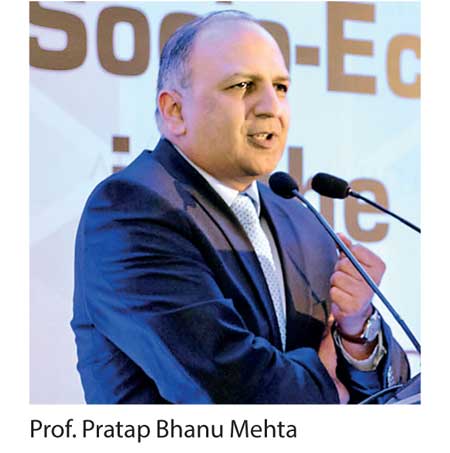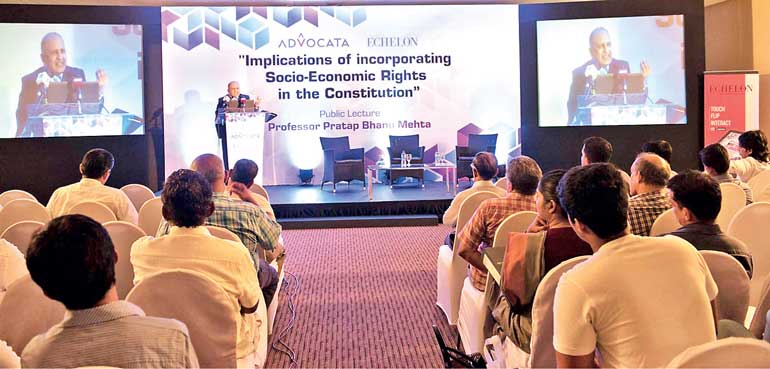Monday Feb 23, 2026
Monday Feb 23, 2026
Friday, 21 April 2017 00:00 - - {{hitsCtrl.values.hits}}

Prof. Pratap Bhanu Mehta, a renowned political scientist from India, gave a talk in Colombo recently on India’s experience in incorporating socioeconomic rights in the constitution. Little known to the public at large, a spirited debate is now taking place on whether or not Sri Lanka should incorporate social and economic rights in the Constitution.
Prof. Mehta argued that going beyond the ideological divisions that often dominate this debate, it’s better to ask what specific problems Sri Lanka wants to address through constitutionalising socioeconomic rights. He argued that whilst socioeconomic rights does have expressive value, there’s very little empirical evidence to suggest that incorporating socioeconomic rights will improve governance issues that prevents a democracy from achieving these desirable outcomes in areas of education, health and other areas.
Here are excerpts from his speech delivered at an event organised by the local think tank Advocata Institute in February. Prof. Mehta explained that in the 1950 when India drafted its constitution, they did not constitutionalise socio economic rights for the following reasons.
“B.R. Ambedkar, the architect of the Indian Constitution, in his earlier work was inclined upon expansive constitutionalisation of these rights. But when it came to the constituent assembly, he changed his position. There were two intuitions behind his change of positions that I think is very instructive for any debate on this question.
“First, he argued if you are constitutionalising social and economic rights and making them justiciable, you are implicitly trusting courts to deliver on those rights more than legislatures. The question to ask is, under what conditions is that trust justified? Why do we think we should trust judges more than we trust our politicians? This is not an easy question to answer. The reason lawyers and middle classes like these rights is because we think, somehow judges as a class as a virtue of that institution will be insulated from politics. Because they are insulated from politics, they can deliver those that things we want to deliver.
“Ambedkar was on the whole a little sceptical of that idea. He was not saying judges are bad or that they can’t be trusted. But he felt if a society reaches a point where you feel like you need to put trust more on judges than your politicians, then there’s probably a deeper corrosion of democracy anyway -- You are in much bigger trouble.
“The second reason he changed his mind was, he felt that in any society, there’s a difference in opinion over economic matters. In India’s constituent assembly for example, we have communists, socialists, free market liberals, etc. and Ambedkar’s basic argument was that a constitution shouldn’t pre-judge many of these choices. We could all agree that having more health care, education, worker’s welfare are good ideas. But we might disagree on the institutional architecture that’s going to produce that outcome. His worry was that deep entrenchment of these rights in a constitutional structure, abridge that democratic and political discussion. That what that best solution should ultimately emerge out of democratic politics. That this should be open to iterative re-examination. So for example, sometimes we strengthen property rights, but it doesn’t work and global economic circumstances change – we might have to change our stance.”
Taking the example of workers’ welfare, Prof. Mehta argued that while everyone in society may agree that increasing worker’s bargaining power is a good idea, there may be more than one ways to achieve that end.
“How do you decide which is correct? Ambedkar’s basic point was, this a kind of thing that needs to be amenable to iterative learning. The danger of constitutionalising is that you may be doing so on premises that actually shift very fast. Because economies change and so forth.
“My view judging by the Indian experience is that I think this way of thinking; The two questions of ‘Are courts going to be better guarantors of rights than legislators?’ and secondly, ‘Is the nature of this problem such that it should be open to quick iterative learning and democracy rather than be fixed in stone by a set of constitutional principles?’ That is the reason why, we in India ended up with directive principles of state policy and not socio economic rights.”
However subsequently in the 1990s, Indian courts in ways that B.R. Ambedkar feared it might, broadly interpreted an article in the Indian constitution which spoke about a “right to life” and began reading all kinds of socio economic rights into the constitution. Indian courts also weakened property rights so as to enable redistribution of property. But here, this backfired.
Prof Mehta explained, “Looking back into the last 70 years, this is the biggest paradox. By weakening the right to property, it allowed the state to dispossess the poor much more easily than they dispossessed the rich. The state used its power of eminent domain not just for infrastructure projects but for helping all kinds of private developers.”
The question to ask in the Indian case, says Prof. Mehta, is whether Indian governance has improved as a result of the promulgation of these rights. To which he responds, “my short answer would be – very little.”
He explained the paradox the constitutionalisation of these rights in the domain of education and the environment.
“The court pronounced the right to education. We now have a right to education bill as a result. But this bill was passed the day India’s enrolment in primary education had already reached 100%. So the right came after the fact, but more importantly, the right focuses is largely on the input side of education. So you must have a school of such square foot area, but this has absolutely no bearing on learning outcomes. In fact India’s learning outcomes have worsened after that right was pronounced. Similarly in the right to environment; ask yourself, how does India with the most progressive environmental laws in the world, ended up with the filthiest air and water in the world?”
On the right to health, Prof. Mehta admits that the court’s interventions has put a little bit of pressure on the executive to answer for certain lapses, but again the constitutionalisation has failed to create a better public health system.
“In short, what I’m saying is that the very governance pathologies that prevented us from doing well with those rights in the first place are reproduced when the courts try to administer these rights. Partly because beyond a certain point they don’t have the power to enforce these rights.”
As more of a gulf develops between the court’s pronouncement of these rights and appropriate remedies, citizens lose faith in the rule of law. Prof. Mehta explains, “As an example, in India the court pronounced this magnificent right to livelihood and right to shelter. Great rhetoric. But what was the remedy the court provided? Well, it’s basic few things like, adopt due process, before you evict people give them six weeks’ notice instead of four, etc.”
As courts are ill-equipped to design the appropriate remedies, the ‘domain of illegality’ increases.
“So you have this paradox, as a citizen thinks he or she is entitled to a right. But it’s subversion of rule of law to say I have the right but I don’t know what remedy is going to be attached to it.”
In conclusion, Prof. Mehta says there’s empirically, around the world, there’s very little evidence to suggest constitutionalising socio and economic rights makes a huge difference to governance. If Sri Lanka, through the conclusion of this debate does indeed decide to incorporate socioeconomic rights into the constitution, the constitution drafters must also put underneath a clear legislative framework, so that the right is conditional.
“Having the right to health, what does that right entail? The European drafting on this (ECHR) says everyone has the right to preventive health care. The right to benefit from medical treatment under conditions established by national law and practices. It’s a conditional right. What you need to do is specify what the national law and practices are.”
Otherwise, concluded Prof. Mehta, Sri Lanka may end up with B.R. Ambedkar’s worst nightmare in constitutionalising these rights and unintended consequences where,
“You have the economy governed by courts. Power taken away the legislature and democratic process. And a perverse outcome where the right can be used more as it were to buttress the rights of the privileged rather than to protect the weak and vulnerable, which was what that right was meant to do.”